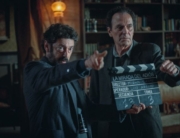Babylon’s place in British film history is significant. After winning acclamation at the 1980 International Critics’ Week in Cannes, it was released in England with an X rating and was dropped by the New York Film Festival, deemed too controversial for American audiences. Almost 40 years later, the X rating is unfair and extremely hyperbolic. You won’t find sex scenes, and the circumstantial violence never pretends to be shocking. After watching it though, you can immediately understand the real concerns at the time: it wasn’t what the movie depicted but what it said about class conflicts, racism, and normalized xenophobia in Thatcher’s Britain in the early eighties.
Directed by Franco Rosso, an Italian filmmaker based in London, Babylon presented the kind of clear and detached perspective that usually only comes from a foreign vision, and Chris Menges’s gritty cinematography looks clearly inspired by the first batch of Scorsese movies (Mean Streets and Taxi Driver). The script portrays a black immigrant community living in South London and follows the steps of Blue (Brinsley Forde) and his troupe of friends. They are fully involved in the musical scene that ignites their nights of parties and DJ battles.
For Blue, that part of his life represents his true passion, while the rest of the day he’s a black, poor immigrant working in a car repair shop constantly dealing with the racism of his neighbors and the abuse of power from policemen. The movie benefits from Forde’s status as a reggae singer (of the group Aswad) and underlines the purpose of using reggae as a means of protest and rebellion against oppressive forces. Reggae and other aspects related to Jamaican culture serve as anchors.
The artistic inclinations of Blue deepen his struggle between his aspirations and bitter reality. He has a lot to lose just for being black and being seen as a foreigner, and the collective tale of his peers hardly becomes an inspiring story of personal triumph. In the eyes of Rosso, the world doesn’t work that way. Someone like Blue could have been easily successful on his own terms in another type of film from the eighties. Here, he’s a Jamaican hearing the same angry shouting of “get back to your country.” Some of his friends react violently, while others try to pretend that nothing happened. Whatever they do, they are never exempted from being cornered by police roundups at any time and with no explanation.
Rosso does not pretend to draw a dividing line of good and evil sides. The social denouncement on racism and xenophobia cuts both ways. The social and cultural context shape people as a matter of fate. In Babylon, the only option is to become, sooner or later, the pariah society fears. It’s tough to accept this historical determinism where the prejudice triumphs. However, you can’t blame Rosso for choosing reality over fantasy. This was particularly radical considering how eighties movies tend to lean toward optimist escapism.
Despite its visionary and atypical nature (the movie was released six years before Spike Lee’s debut, for example), Babylon still resembles a product of the era with a message overshadowed by subsequent films that are sharper and more socially conscious, and made by black filmmakers, such as Isaac Julien (Territories, 1984), Horace Ové (Playing Away, 1986), or Menelik Shabazz (Burning an Illusion, 1981).
At the present time, it’s easy to imagine a good reception in America for this film. Today Babylon would be better appreciated by a large number of critics (and committed audiences) who tend to celebrate movies in line with specific social contents and cultural implications. Ironically, this will be the right time to release it in the country that once shunned it for being too “real” to handle it.







Leave A Comment